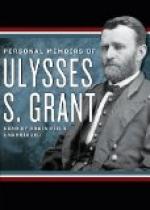Now one of the main objects of the expedition began to be accomplished. Sheridan went to work with his command, gathering in the crops, cattle, and everything in the upper part of the valley required by our troops; and especially taking what might be of use to the enemy. What he could not take away he destroyed, so that the enemy would not be invited to come back there. I congratulated Sheridan upon his recent great victory and had a salute of a hundred guns fired in honor of it, the guns being aimed at the enemy around Petersburg. I also notified the other commanders throughout the country, who also fired salutes in honor of his victory.
I had reason to believe that the administration was a little afraid to have a decisive battle at that time, for fear it might go against us and have a bad effect on the November elections. The convention which had met and made its nomination of the Democratic candidate for the presidency had declared the war a failure. Treason was talked as boldly in Chicago at that convention as ever been in Charleston. It was a question whether the government would then have had the power to make arrests and punish those who talked treason. But this decisive victory was the most effective campaign argument made in the canvass.
Sheridan, in his pursuit, got beyond where they could hear from him in Washington, and the President became very much frightened about him. He was afraid that the hot pursuit had been a little like that of General Cass was said to have been, in one of our Indian wars, when he was an officer of army. Cass was pursuing the Indians so closely that the first thing he knew he found himself in front, and the Indians pursuing him. The President was afraid that Sheridan had got on the other side of Early and that Early was in behind him. He was afraid that Sheridan was getting so far away that reinforcements would be sent out from Richmond to enable Early to beat him. I replied to the President that I had taken steps to prevent Lee from sending reinforcements to Early, by attacking the former where he was.
On the 28th of September, to retain Lee in his position, I sent Ord with the 18th corps and Birney with the 10th corps to make an advance on Richmond, to threaten it. Ord moved with the left wing up to Chaffin’s Bluff; Birney with the 10th corps took a road farther north; while Kautz with the cavalry took the Darby road, still farther to the north. They got across the river by the next morning, and made an effort to surprise the enemy. In that, however, they were unsuccessful.
The enemy’s lines were very strong and very intricate. Stannard’s division of the 18th corps with General Burnham’s brigade leading, tried an assault against Fort Harrison and captured it with sixteen guns and a good many prisoners. Burnham was killed in the assault. Colonel Stevens who succeeded him was badly wounded; and his successor also fell in the same way. Some works to the right and left were also carried with the guns in them—six in number—and a few more prisoners. Birney’s troops to the right captured the enemy’s intrenched picket-lines, but were unsuccessful in their efforts upon the main line.




